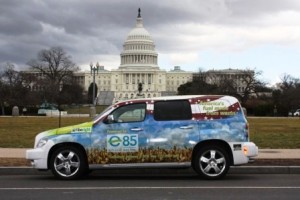In a publicity stunt that attempts to prove a point about biofuels made from waste, a Chevy fueled with the byproducts of government office paper and cardboard will appear on the streets of Washington D.C. today.
A small company called Novozymes has collaborated with Maryland-based Fiberight to provide the demonstration fuel.
Taxpayers, who also underwrite the production of government paper, funded the research. Novozymes received two contracts from the Department of Energy for its research efforts to bring down the cost of enzymes and improve their efficiency in converting cellulose to biofuels. The first contract for $2.2 million was given in 2002, and the second for $12.3 million was given in 2008.
Automakers are given fuel economy credits for producing ethanol-compatible vehicles even though few of them are ever operated on ethanol, which is not cost competitive with gasoline with current production methods.
It is thought that using biomass – inexpensive farm waste – could radically alter the economics of ethanol. For example, making ethanol from the cellulose of plants is less costly than using corn grain. Switch grass, a crop that grows readily in the U.S. east of the Rocky Mountains, and corn leaves and stalks or other crop wastes are cheap to acquire and potentially solve the starvation issue, which arises from using corn for fuel instead of feed.
The lower cost could also end the huge taxpayer subsidies, although the farm lobby holds powerful sway in the “pay to play” Washington scene and has successful defended against reformers its taxpayer supplied pork for decades.
Because of this work, Novozymes claims it reduced enzyme costs over the years, including 50% percent reduction announced in 2009. Most recently, the company received a $28.4 million tax credit toward the construction of its enzyme manufacturing facility in Blair, Nebraska, which will create 100 new jobs.
Thus far, no commercially viable cellulosic distilling process is successfully in operation, although demonstration programs continue.
Coskata Incorporated, a developer of biofuels, last fall announced the start-up of its semi-commercial flex-ethanol plant in Madison, Pennsylvania. The operation potentially represents a scale-up of company’s heretofore experimental technology. It could evolve into the world’s first commercially viable ethanol process that would use biomass rather than foodstocks, such as corn, which are almost exclusively used for the mass production of ethanol. (See Biomass Ethanol Moves a Semi-Step Forward.)
U.S. energy policy, which grants ethanol a 52-cent per gallon taxpayer subsidy to politically connected farmers, is controversial since production of the fuel over its life cycle consumes as much or more energy than it produces.
Furthermore, numerous studies have shown that if ethanol were to replace oil, people would starve from the resulting lack of grain in the world’s markets. U.S. tariff policy also effectively blocks the importation of sugar-cane-derived ethanol from Brazil, currently a much more efficient and sustainable process.
Government officials and media will have the chance to test drive a flex-fuel Chevrolet HHR at the Washington Convention Center. In the exhibition hall, a flex-fuel Ford F150 – also fuelled with the wastepaper-based biofuels – will be on display throughout the week. Both vehicles run on E85, a blend of 85% biofuel and 15% gasoline.
Novozymes says its multi-year research and development efforts have resulted in an enzyme “cocktail” that can now be used to make advanced biofuel from agricultural residues, municipal waste and energy crops.
After pulping, pre-treatment and wash, enzymes from Novozymes turn the paper and cardboard waste into sugars that are then fermented into biofuel. A sample of the paper feedstock will also be on display throughout the show.
“The advanced biofuels showcased here today demonstrate that the enzyme technology is ready for market” says Adam Monroe, president, Novozymes North America. “What we need now is commercialization and deployment of advanced biofuels in order to help meet our country’s most pressing energy and environment challenges.”
Proponents of advanced biofuels claim they can deliver up to a 90% CO2 emission reduction compared to gasoline and are the most cost-efficient way of reducing CO2 in the transport sector.
Novozymes stock is traded on OMX Nordic Exchange Copenhagen A/S (NZYM B).

